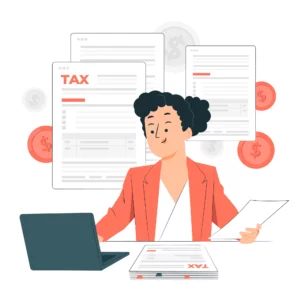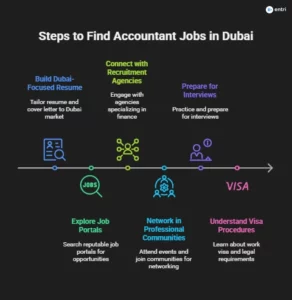Table of Contents
Key Takeaways:
- Dubai’s accounting job market is robust, with hundreds of vacancies monthly fueled by growth in sectors like real estate, finance, hospitality, and digital economy.
- Employers seek candidates with a Bachelor’s degree in accounting or finance, plus recognized certifications such as CPA, ACCA, or CMA, which significantly improve job prospects.
- Practical knowledge of UAE-specific VAT and tax regulations, coupled with expertise in accounting software like TallyPrime, QuickBooks, and cloud-based platforms, is highly valued.
- A well-crafted, Dubai-tailored resume paired with strategic use of local job portals and recruiter networks can dramatically increase interview chances.
- Strong networking, interview preparation focused on Dubai business norms, and understanding of visa/work permit rules are essential steps toward securing a job.
Introduction: Why Dubai is a Top Choice for Accountants in 2025
Dubai continues to attract finance professionals globally with its tax-free salaries, dynamic economy, and diverse business ecosystem. This emirate hosts a growing number of multinational corporations, startups, and fintech ventures—all needing skilled accountants to handle complex financial environments.
However, Dubai’s accounting roles are more than just number crunching. As automation and AI redefine finance operations, companies seek professionals who blend technical accounting expertise with strategic financial insight and digital fluency. To succeed, accounting aspirants must understand local financial regulations, UAE tax laws, and get hands-on experience with industry-standard software. This blog provides all the necessary information on how to secure an accountant job in Dubai, with a detailed step-by-step guide.
Also read: What is Accounting?
Understanding Dubai’s Accounting Job Market
1: Accounting provides information on
Dubai is often described as a land of opportunity — and when it comes to accounting jobs, this couldn’t be more true. With rapid economic growth, a flourishing corporate landscape, and Dubai’s ambition to become a major financial hub, the demand for talented accountants has soared. Every month, hundreds of vacancies open up for accounting professionals across industries like real estate, hospitality, retail, and finance. What’s exciting about Dubai’s market is the mix of traditional accounting roles alongside new-age finance positions driven by technology and innovation.
Become an Accounting Pro – Learn from Industry Experts!
The rise of digital technologies such as cloud accounting, AI automation, and advanced finance software has reshaped the accounting landscape. Employers today seek professionals who are not just number crunchers but strategic thinkers capable of using tools like TallyPrime, Zoho Books, and ERP software to unlock better business insights. The finance sector in Dubai is increasingly dynamic — making it an excellent place for accountants who are eager to learn, adapt, and grow. For job seekers, this means staying updated with the latest trends and continuously building skills that go beyond conventional accounting are key to success.
People also read: Do Accountants Still Have a Future in 2025?
Tip: Regularly check Dubai-based job portals and maintain an updated LinkedIn profile tailored to UAE recruiters.
Placement Oriented PWC Business Accounting Course
PWC Certified Business Accounting Course by Entri App: Master in-demand skills, ace interviews, and secure top-tier jobs.
Join Now!Essential Qualifications and Skills for Accountants in Dubai
To truly stand out and succeed in Dubai’s competitive accounting job market, you need a mix of formal education, professional certifications, technical know-how, and soft skills. Before jumping in, you need to have a strong understanding of the roles and responsibilities of an accountant. Here’s a detailed look at the qualifications and skills that employers value most:
-
Bachelor’s Degree in Accounting, Finance, or Related Field
A bachelor’s degree remains the fundamental educational requirement. Whether it’s a degree in accounting, commerce, finance, or business administration, this academic foundation is crucial for grasping core accounting principles and financial management.
Enroll in our PwC Edge course to get placed at the Big 4!
-
Professional Certifications That Elevate Your Profile
Global and regional professional qualifications significantly enhance your credibility and career prospects in Dubai. The most sought-after certifications include:
-
-
ACCA (Association of Chartered Certified Accountants): Recognized worldwide, ACCA offers deep knowledge in financial reporting, auditing, taxation, and business ethics. It’s highly respected in Dubai’s financial hubs.
-
CPA (Certified Public Accountant): Especially valued in multinational companies, CPA equips accountants with advanced auditing and financial reporting skills relevant to global standards.
-
CMA (Certified Management Accountant): For those interested in management accounting and financial strategy, CMA adds skills in budgeting, risk management, and performance management.
-
Additionally, Chartered Accountancy (CA) credentials from India or other countries are recognized and respected within UAE companies, especially for audit and tax roles.
-
UAE-Specific Credentials: Courses or certificates in UAE VAT, Corporate Tax, and local financial regulations reflect your understanding of the regional compliance framework and make your application stronger.
-
Know more: Accounting Certifications vs Degrees: Which One Should You Choose?
-
Technical Competency in Accounting Software and Tools
Hands-on experience with popular accounting software is no longer optional—it’s vital. Mastery of platforms commonly used in Dubai includes:
-
-
TallyPrime: Widely used by SMEs for bookkeeping and statutory compliance.
-
QuickBooks and Zoho Books: Cloud accounting platforms preferred by many startups and small businesses.
-
ERP Systems (like SAP, Oracle): Larger companies seek accountants who can operate and extract reports from integrated enterprise systems.
-
Microsoft Excel: Beyond basic spreadsheets, skills in formulas, pivot tables, and Power Query/Power BI for data analysis are in high demand.
-
-
Knowledge and Application of UAE VAT and Tax Laws
Since the introduction of VAT in the UAE, understanding its rules and compliance has become indispensable for accounting professionals. Employers expect you to be conversant with VAT filing processes, tax documentation, and regulatory changes affecting financial reporting.
-
Soft Skills That Complement Technical Ability
-
Communication: Clear, concise reporting and ability to explain financial data to non-accountants is critical.
-
Attention to Detail: Accounting demands precision—an error can mean costly compliance issues.
-
Time Management: Handling financial closes, audits, and reporting deadlines require excellent organizational skills.
-
Problem-Solving: The capacity to analyze financial data and offer actionable insights is what turns an accountant into a valued advisor.
-
-
Language Proficiency
English is the business language across Dubai’s multicultural environment. Effective verbal and written English communication can set you apart. While not always mandatory, having some Arabic language skills can be an advantage, especially in dealings with government entities.
-
Experience Counts—Internships and Practical Exposure
For fresh graduates or career switchers, relevant internships or on-the-job training within finance departments add considerable weight. Dubai employers appreciate candidates who demonstrate practical understanding combined with academic learning.
How to Find and Apply for Accountant Jobs in Dubai
Finding an accounting job in Dubai can feel like a big challenge—but breaking it down into clear steps makes it manageable. Follow this proven roadmap to boost your chances and land the right role:
Step 1: Build a Dubai-Focused Resume and Cover Letter
-
Tailor your resume for Dubai employers by highlighting your accounting qualifications, UAE-specific compliance knowledge such as VAT, and software expertise (TallyPrime, QuickBooks, etc.).
-
Use clear, concise language, quantify achievements where possible, and keep the format professional but readable.
-
Write a cover letter that shows why you’re motivated to work in Dubai and how your skills align with the job role.
Step 2: Explore Reputable Job Portals and Apply Strategically
-
Register on popular Dubai job websites like Naukri Gulf, Indeed UAE, LinkedIn UAE, and finance-specific job boards.
-
Set up personalized job alerts with keywords like “accountant jobs in Dubai,” “Dubai accounting openings,” and “finance jobs UAE.”
-
Apply to roles that match your experience and qualifications—quality over quantity matters.
Step 3: Connect with Recruitment Agencies Specializing in Finance
-
Reach out to recruitment consultants who focus on accounting and finance roles in the UAE market.
-
Share your CV and discuss your career goals so they can recommend suitable openings.
-
Keep building relationships; recruiters often know about unadvertised or upcoming job vacancies.
Explore our free foundational accounting courses now!
Step 4: Network Within Professional Communities and Events
-
Join LinkedIn groups, Facebook communities, and attend webinars or meetups specific to Dubai’s finance professionals.
-
Engage in discussions, share insights, and connect with senior accountants or hiring managers.
-
Personal referrals and connections can significantly increase interview opportunities.
Step 5: Prepare Thoroughly for Interviews
-
Study common interview questions for accounting roles, focusing on both technical skills (accounting principles, software proficiency) and interpersonal abilities.
-
Understand Dubai’s business environment, local tax regulations, and industry-specific challenges.
-
Practice confidently articulating how your skills will add value to potential employers.
Also read: Top 25 Accounting Interview Questions and Answers
Step 6: Understand Work Visa and Legal Procedures
-
Know the documents and sponsorship requirements for a work visa in Dubai—your employer typically sponsors this.
-
Familiarize yourself with the terms of employment contracts under UAE labour laws to protect your rights and avoid surprises.
-
Ensure timely visa processing and maintain communication with HR to comply with regulations.
Bonus: Salary of Accountants in Dubai
| Accountant Level | Average Monthly Salary (AED) | Salary Range (AED) | Description |
|---|---|---|---|
| Entry-Level Accountant | 6,440 | 5,000 – 8,000 | Suitable for fresh graduates or those with less than 2 years of experience. Tasks include bookkeeping, invoice processing, and basic reconciliations. |
| Junior Accountant | 8,000 | 7,000 – 11,000 | Professionals with 2-4 years of experience handling more complex financial tasks and reporting. |
| Senior Accountant | 13,000 | 10,000 – 16,000 | Accountants with 4-7 years of experience managing financial statements, audits, and supervising junior staff. |
| Accounting Manager | 20,000 | 15,000 – 25,000 | Responsible for overseeing accounting teams, reporting, compliance, and strategic financial planning. |
| Financial Controller | 30,000 | 25,000 – 40,000 | Senior finance role managing company-wide accounting operations, budgeting, and financial policy implementation. |
| Chief Financial Officer (CFO) | 50,000+ | 40,000 – 70,000+ | Top executive role steering overall financial strategy and decision-making for the organization. |
People also read: How Much Do ACCA Professionals Earn in Dubai?
Placement Oriented PWC Business Accounting Course
PWC Certified Business Accounting Course by Entri App: Master in-demand skills, ace interviews, and secure top-tier jobs.
Join Now!How Entri’s Accounting Courses Support Your Dubai Career Ambitions
Embarking on an accounting career in Dubai is exciting but can feel overwhelming. Entri’s accounting courses are designed to equip you with practical skills and confidence to meet employer expectations and excel in Dubai’s competitive market:
-
Gain Practical Knowledge:
Learn essential accounting principles and UAE-specific regulations like VAT through hands-on training, not just theory. This approach helps bridge the gap between classroom learning and real job tasks.
-
Master Industry-Standard Software:
Get comfortable with popular accounting tools such as TallyPrime, Zoho Books, and Excel, all of which are widely used by Dubai firms.
-
Build UAE-Relevant Skills:
Courses cover UAE tax compliance and financial reporting, ensuring you understand the local legal framework employers care about.
-
Boost Strategic Thinking:
The Strategic Accounting and Finance Programme goes beyond basics to teach financial analysis, planning, and data-driven decision-making — skills valued in senior roles.
-
Learn From Experts:
Access live sessions, doubt clearing, mentorship, and career guidance, offering a supportive learning environment tailored to your success.
-
Career Support and Placement:
Benefit from placement assistance and resources that help translate your training into job offers, making your career transition smoother.
-
Complement Community Learning:
Combine course learning with networking and industry engagement for a well-rounded professional profile that stands out.
Conclusion: Elevate Your Accountant Career in Dubai Today
Dubai’s financial landscape is booming, offering vast opportunities for skilled accountants who combine technical knowledge, local compliance expertise, and digital adaptability. By gaining relevant qualifications and hands-on skills, you position yourself for success in this global finance hub.
Invest in your growth by enrolling in Entri’s Practical Accounting Course or PwC Edge: Strategic Accounting and Finance Programme—career-focused trainings designed to equip you with the knowledge and confidence to stand out in Dubai’s competitive job market.
Take the next step—upskill, enhance your profile, and unlock your potential for a thriving accounting career in Dubai.
|
Related Articles |
||
|
How BCom Graduates Can Launch a Successful Career in Data Analytics |
||
Placement Oriented PWC Business Accounting Course
PWC Certified Business Accounting Course by Entri App: Master in-demand skills, ace interviews, and secure top-tier jobs.
Join Now!Frequently Asked Questions
What qualifications do I need for an accounting job in Dubai?
A Bachelor’s in Accounting or Finance is essential; professional certifications (CPA, ACCA) add major value.
How much can an accountant expect to earn in Dubai?
Entry-level salaries range from AED 6,440 to 10,000 monthly; experienced professionals earn upwards of AED 21,000/month.
Is understanding UAE VAT law important?
Absolutely, as VAT compliance is critical for finance roles in Dubai.
Can fresh graduates get accounting jobs in Dubai?
Yes, especially if combined with internships, certifications, or practical course training.
Are remote accounting jobs available from Dubai?
Increasingly yes, particularly for cloud-based accounting roles in multinational firms.
















